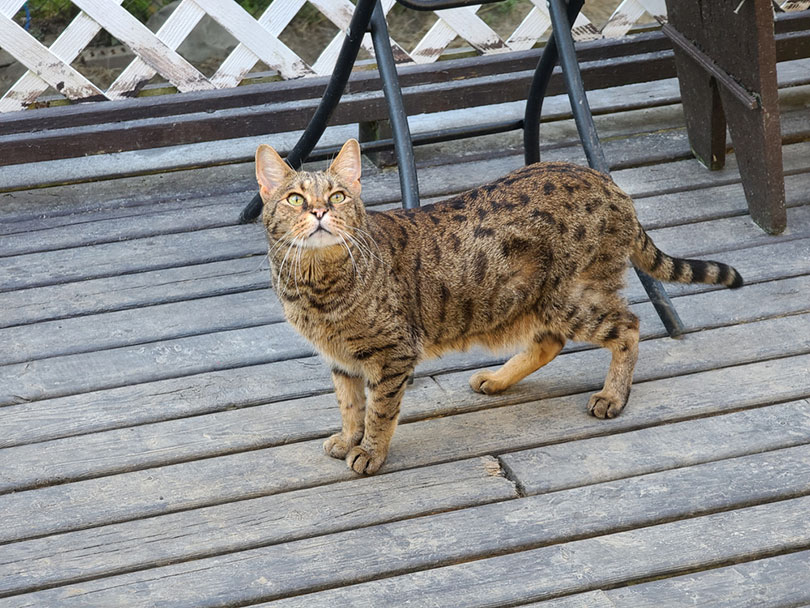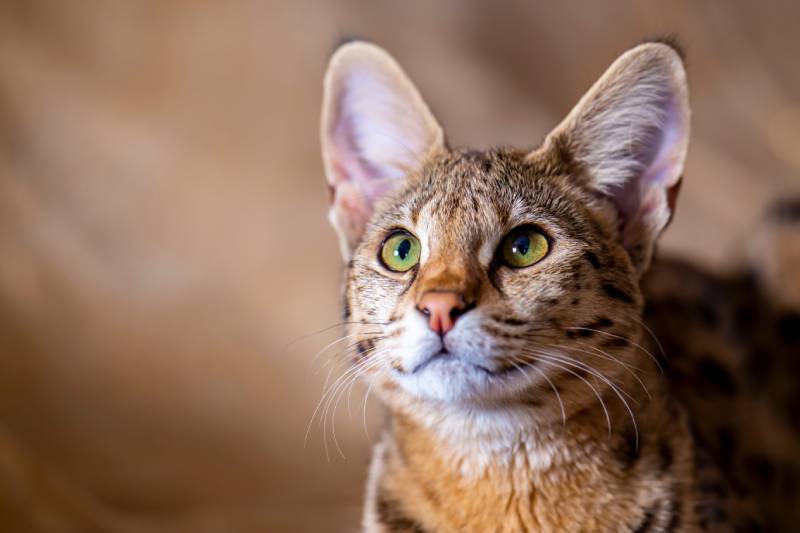Are Savannah Cats Legal? In What States?
Updated on

It’s important for any pet owner to know and understand the legalities that may come along with certain pets. Since Savannah cats are a hybrid breed that shares a close ancestry with the wild African Serval, you may run into some legal roadblocks when it comes to owning these amazing cats.
The legality of owning a Savannah will vary according to state and local laws. They may be completely legal to own in some places while being banned in others. Certain states or municipalities may also require special permits.
Since they are categorized by filial generation, this can also play a part in whether they are legal or not. Here we will dive further into the legalities surrounding the Savannah cat and the current laws in each state.
Savannah Ownership by State (Current)
Laws regarding the ownership of exotic and hybrid animals, including Savannah cats, are subject to change. The information below includes the current legalities in each of the 50 states.
| State | Legal Savannah Cat Ownership by Categorized Generation |
| Alabama | All generations legal |
| Alaska | F4 and later are legal |
| Arizona | All generations legal |
| Arkansas | All generations legal |
| California | All generations legal |
| Colorado | F4 and later are legal (Illegal within Denver city limits) |
| Connecticut | All generations legal |
| Delaware | Permit required |
| Florida | All generations legal |
| Georgia | Illegal statewide |
| Hawaii | Illegal statewide |
| Idaho | All generations legal |
| Illinois | All generations legal |
| Indiana | All generations legal (permit may be required in certain counties) |
| Iowa | F4 and later are legal |
| Kansas | All generations legal |
| Kentucky | All generations legal |
| Louisiana | All generations legal |
| Maine | All generations legal |
| Maryland | All generations legal (Must weigh under 30 pounds) |
| Massachusetts | F4 and later are legal |
| Michigan | All generations legal |
| Minnesota | All generations legal |
| Mississippi | All generations legal |
| Missouri | All generations legal |
| Montana | All generations legal |
| Nebraska | Illegal statewide |
| Nevada | All generations legal |
| New Hampshire | F4 and later are legal |
| New Jersey | All generations legal |
| New Mexico | All generations are legal (Some cities may require a permit) |
| New York | F5 and later are legal (Illegal in New York City proper) |
| North Carolina | All generations legal |
| North Dakota | All generations legal |
| Ohio | All generations legal |
| Oklahoma | All generations legal |
| Oregon | All generations legal (Permit may be required in certain cities/counties) |
| Pennsylvania | All generations legal |
| Rhode Island | Illegal statewide |
| South Carolina | All generations legal |
| South Dakota | All generations legal |
| Tennessee | All generations legal |
| Texas | Illegal in most counties (must check with county government) |
| Utah | All generations legal |
| Vermont | F4 and later are legal |
| Virginia | All generations legal |
| Washington | All generations legal (banned in Seattle city limits |
| Washington D.C. | All generations legal |
| West Virginia | All generations legal |
| Wisconsin | All generations legal |
| Wyoming | All generations legal |
 The Importance of Legal Ownership
The Importance of Legal Ownership
Laws surrounding the ownership of exotic and hybrid animals are subject to vary by state, county, or municipality and are subject to change. Anyone interested in welcoming a Savannah cat into their family should check with their state and local government before ever making a final decision.
Reputable Breeding Practices
When searching for a Savannah cat, owners should do their research and locate a reputable Savannah breeder. Reputable breeders will also stay up to speed with laws and ensure their kittens are going to a home where ownership is legal. There may even be a contract involved upon purchase that covers any necessary agreements regarding legalities.

 Understanding Filial Generation Legality
Understanding Filial Generation Legality
When you are looking into the laws in your area, make sure you compare any legalities related to the filial generation of the Savannah cat. As you can see above, there are plenty of states that allow F4 and later filial generations without issue but have laws against F1 through F3 Savannahs.
Permits
There are certain cities, counties, and even states that will require special permits to own a Savannah cat. Check with your local government about the law and how you would go about obtaining these permits if necessary.

Crossing State Lines
Even if you live in an area where ownership is legal, you could run into some trouble if you were caught transporting a Savannah cat across state lines. Even if you are just traveling with your pet, transporting exotic animals can have serious consequences and could result in the cat being confiscated. Before traveling with your Savannah, look up the laws in all the areas you will be visiting, even if it’s just for pit stops.
Consequences of Illegal Ownership
The legal consequences of illegally owning a Savannah cat or any other exotic animal can result in some pretty hefty fines and will likely result in your pet being taken from you.
Savannah Cat By Generation
Savannah cats are categorized by filial generation, which is the number of generations they are removed from the Serval. You will notice Savannah cats labeled F1 and continuing to F5 and beyond. The “F” stands for filial generation, and the number stands for how many generations removed the cat from their wild ancestry.
F1 is closest generationally with the Serval at 50%. F5 Savannah cats are typically no more than 12% Serval. In certain areas, the laws may allow certain filial generations while prohibiting others. As you can see above, legal Savannah cats typically start at the F4 filial generation or later in a lot of places.

Categorization
The filial (F) generation works independently from the A/B/C/SBT registration system that is used by TICA for the registration of the breed. For a Savannah to be eligible for TICA registration, they must be at least four generations removed from the Serval.
A: One parent is a Savannah cat, and the other parent is either a serval or another domestic cat breed.
B: Both parents are Savannah cats, but one grandparent is a different breed.
C: Both parents and grandparents are Savannah cats, but at least one of the great-grandparents is of a different breed.
SBT: A cat that has SBT (Stud Book Traditional) in the registration code has at least three generations of Savannah-to-Savannah pairings within its pedigree. Only cats with F4 or later generations can be designated as SBT, and per TICA, Savannah cats must be SBT to be shown in the championship class.
Final Thoughts
Though Savannah cats are legal in many areas, state and local laws will ultimately determine whether ownership is legal, illegal, or requires special permits or other specific legalities. Some areas consider F1 through F3 Savannah cats as exotic animals that are illegal to own while fully allowing ownership of generations F4 and later.
While we have provided an up-to-date list of the current laws for each state, potential owners need to look up the laws in their area by either calling or utilizing official government websites to get the most accurate and up-to-date information. Illegal ownership can result in serious fines and the risk of losing your beloved pet.
See also: What Is the State Cat of Massachusetts? History & Significance
Featured Image Credit: kuban_girl, Shutterstock











